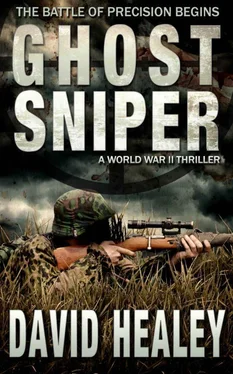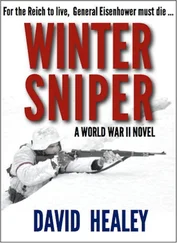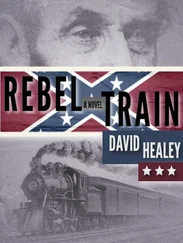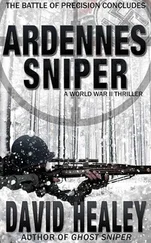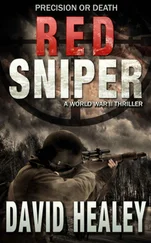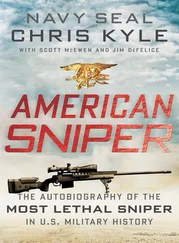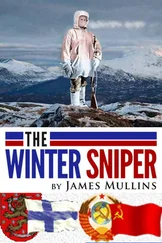He’d also brought Fritz along. The boy was useless as a soldier, but he made a good pack horse, carrying food, the spare uniform and helmet and rope, and extra ammunition. Once Von Stenger had hidden himself in the trees, he planned to shoot as many Allied troops as possible without having to worry about resupplying.
“Here is what I want you to do with the uniform,” Von Stenger said to the boy, and showed him how to stuff it with pine straw until it had some semblance of a human form. “Now, you climb. You can be a monkey, can’t you?”
It was hard to see in the pre-dawn darkness, but Fritz managed to get maybe five meters into the tree, and then lowered a rope. Von Stenger tied the dummy to that and had the boy haul it up. Following the sniper’s directions, Fritz perched the dummy on a long branch, then lashed a rifle along the branch, as if the dummy was aiming the weapon.
“Be careful, boy, that rifle is loaded.”
Up close, the dummy was not very convincing. But seen from the other side of the river, obscured by trees, the dummy would be enough to fool an American marksman.
A string ran from the trigger of the rifle, then around a branch that served as a fulcrum, and from there down to the forest floor. Von Stenger waited until Fritz had climbed down. “When I tell you to, you pull that string. It will make the rifle fire.”
Even in the dim light, Von Stenger could see the boy’s quizzical look. “But Herr Von Stenger, the dummy can’t hit anything.”
“I don’t want the dummy to shoot anything. That’s my job and Wulf’s. The dummy’s job is to get shot. Now pay attention, and pull that string when I tell you to, and not a moment before. You are our eyes on the ground, so shout a warning if someone comes.”
“Yes, Herr Hauptmann.”
He turned to Corporal Wulf. “You and I will take alternating shots,” he said. “You take the first one. They will send a scout across the bridge first—shoot to wound. The legs are good; the belly is better. The others will come out to rescue him, and then we can pick them off.”
“What if they all come across the bridge at once, Herr Hauptmann?”
“Surely they can’t be that stupid,” he said. “But if they are, stay with the alternating shots. You never know when someone has the sense to shoot back, and it’s best to keep them confused about the target.”
Leaving the boy stationed at the foot of the oak holding the dummy—Von Stenger did not bother giving him a rifle, for fear that he might start shooting at shadows and give away the snipers’ position prematurely—he and Wulf made their way up into trees approximately fifty meters apart and ten meters or so from the edge of the field. They had a sight line on one another, and could signal the other man if necessary. Little communication would be necessary—they had already worked out that they would make alternating shots to confuse the enemy and keep the Americans from zeroing in easily on their positions. If the Americans did have a competent marksman, the dummy would help confuse him.
The tree with the dummy was just a few meters from Von Stenger, but he was more carefully hidden. He wore a camouflaged smock with a hood to which were secured twigs and branches. Even his rifle was wrapped with brownish canvas strips, into which he had stuck a few springs of leaves. He was straddling a thick limb, wedging himself into the crotch formed by the tree limb and the trunk, and while it was not comfortable, it made a solid shooting platform.
When he was finished, the only part of him visible were his eyes, which were light blue and clear. As the light grew in the east and the darkened landscape revealed itself, those sharp eyes kept a close watch on the bridge two hundred meters distant.
The morning was cold and damp, and being forced to lie still along the tree branch allowed the chill to creep through his bones. Of course, it was nothing like the cold of Stalingrad. Religious people liked to say that hell was full of fire and brimstone, but they were wrong. Hell was a cold place, full of ice and snow and Russian snipers who could shoot the eye out of a running hare at 100 meters. Von Stenger preferred Normandy.
The snipers did not have long to wait. The birds had started in the trees, singing in oblivion of the war going on around them, and the light grew stronger. A lone soldier appeared on the narrow bridge, moving slowly forward. He looked somewhat ridiculous, hunched under a heavy pack and with branches stuck into the netting that covered his salad bowl of a helmet, but Von Stenger knew better—the soldier was probably American airborne, a very tough unit.
They let the scout advance halfway across the bridge. Von Stenger had his crosshairs on him, just in case, but then Wulf’s rifle fired off to his left. The soldier on the bridge went down as if someone had kicked his legs out from under him. He started to crawl back across the bridge, and his panicked cries for help carried across to the woods.
Von Stenger only had to wait a few seconds until two soldiers came running to drag their wounded man to safety. He waited for one soldier to lean over his companion and grab hold of the back of his pack to start dragging him, then settled the crosshairs on the soldier’s knee and squeezed the trigger. The soldier went down screaming.
Wulf shot the other soldier through the belly.
No one else came across the bridge. He was thinking that the three wounded men were doing more to discourage anyone from crossing the bridge than the presence of a Panzer tank.
The soldiers lay there, calling out piteously for help. Their cries barely registered in Von Stenger’s mind. He had long since hardened his heart to such things.
The morning grew brighter, and in the distance the chatter of small arms fire and the boom of artillery increased. That would likely be the skirmishing at La Fiere, he thought, or one of several vicious battles taking place in unnamed fields all across Normandy.
On their bridge, nothing happened. One of the wounded men managed to drag himself almost off the bridge and onto the road, but Von Stenger put the crosshairs on the man’s belly and gut shot him. He’d lay like that for hours, alive, but too weak to do anything. It was a little trick he had learned in Russia. Perhaps the Americans would be foolish enough to send someone to try and snatch him to safety.
Von Stenger had brought along a flask of coffee and a ham sandwich. He drank the coffee and ate, keeping an eye on the bridge and road. It was only a matter of time before the Americans tried something. They had to get across that bridge, after all.
After a while the coffee worked its way through and he shifted around so that he could urinate without leaving his sniper’s nest. Below, Fritz looked up in surprise at the sound of Von Stenger’s stream spattering the forest floor.
He had been waiting for something to happen, and finally it did. Someone started shooting from the hill on the other side of the river, above the road. He had to admit it was a good position, one that offered a commanding view of the bridge and road, and as he and Wulf had done, the American snipers had climbed into the trees. They kept up a steady fire, but for the life of him, Von Stenger couldn’t decide what they were shooting at other than the woods itself. Occasionally a bullet came singing in among the trees, ricocheting madly off the trunks, but obviously the American snipers had no target.
Von Stenger decided to give them one.
By then, he had picked out one of the American snipers. He was firing so often that it was fairly easy to locate him. The Americans seemed to be making an attempt to provide covering fire for the troops at the bridge. Through his telescopic sight, Von Stenger could easily see the American. He was not very well hidden because he had set up shop in a tree that had an open avenue through the branches that gave him a clear field of fire—but that also made him visible. He appeared to be a big, bulky fellow.
Читать дальше
